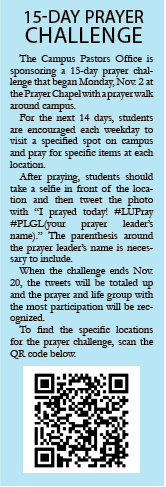Pressing into prayer

Campus pastors speak about how to have healthy communication with God
Students had an opportunity to hear from Liberty’s campus pastors about the power of prayer and how it can affect their lives and spiritual walks. This event was one of many taking place this semester as part of the Live Healthy Liberty initiative.
The event took place in the Terrace Conference Room of the Jerry Falwell Library at 5:30 p.m. Tuesday, Oct. 27.
The session started when Timothy Griffin, executive director of the Campus Pastors Office and a campus pastor himself, opened up the time in prayer and asked God to be with all of the students.
Griffin asked students to define the word “prayer,” to which students agreed on the definition of “communication with God.”
Soon after, Griffin proposed the question of when people should pray, to which he received the response “always.” Griffin went on to explain that prayer does not necessarily mean you have to be down on your knees with your eyes closed, but instead prayer is being in constant communication with God.
“We are praying to a God … who is listening and to a God who is not only listening but who hears. (He) not only … hears, but (he) is capable of answering,” Griffin said.
Griffin then jumped into the three points that he, along with two other members of the campus pastors staff, Emily Woody and Tim Voogd, would cover. The first point was “realize and revere,” the second was “reveal the real,” and the third was “reflect and respond.”
Griffin took the first point and explained it.
“The thought there is realizing who we are praying to … and not just to realize who we are praying to but revering who we are praying to,” Griffin said.
Woody, a life skills coordinator, took the second point, “reveal the real” and shared some of her story about her personal prayer life.
“Because of who I am talking to, I truly can come before him with this realness and rawness of who I am rather than trying to put forward this front of who I think he wants me to be,” Woody said. “I know so many times in prayer that I would try to fit it into this mold and try to make it sound good … rather than remembering and just trusting his love and who he is.”
Woody read from Hebrews chapter 4 starting in verse 12 about how nothing is hidden from God.
Voogd, who oversees the Prayer Center, took the third point, “reflect and respond.” Voogd gave the example of professors making students write essays. He said the reason students are assigned to write out their thoughts instead of just reading from a textbook is because they get a chance to reflect and respond. He related his analogy to students’ prayer lives.
“It takes that thought,” Voogd said. “It takes that process.”
The session ended with questions from the crowd of students and a raffle for a few small prizes.
Foley is the asst. news editor.

